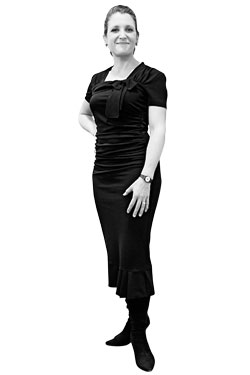
We have the money,” Chrystia Freeland tells me one recent afternoon on the nineteenth-floor newsroom of Reuters’ gleaming Times Square tower. The spunky, Canadian-born editor of Reuters’ rapidly expanding website is sitting in her spartan office giving a sales pitch, pretending to try to hire me. “What I want us to be, and I hope we’re becoming, is a great home for journalists. In this current belt-tightening environment, you often don’t feel a lot of love.”
It’s a spiel Freeland has been using a lot these days. A few days before we meet, Freeland announced her latest recruits: Bethany McLean, of Vanity Fair, and veteran Times reporter Geraldine Fabrikant. The pair join a growing roster of marquee columnists and editors that includes Pulitzer Prize–winning Times reporters David Rohde and David Cay Johnston, former Treasury secretary Lawrence Summers, media critic Jack Shafer, former Times Sunday business editor Jim Impoco, and former Big Money editor James Ledbetter. Freeland’s inside-baseball hope is that high-profile hires will attract media attention and, with it, finally, actual readers.
Freeland was herself a high-profile acquisition for Reuters. In 2010, she left the Financial Times after running the paper’s U.S. edition. “I love the FT,” she says of her former employer. But that doesn’t mean she’s not enjoying scooping her alma mater. “At the FT, the constant refrain was ‘Put up Reuters’ story while we do our version.’ [At Reuters] we are the original version!”
The company was founded in the nineteenth century when a German immigrant named Paul Julius Reuter trained a flock of carrier pigeons to shuttle business headlines between Paris and London. A century and a half later, everyone knows the company, Freeland says. “Remember that horrible episode when there was this woman who said she had been raped in Libya by Qaddafi’s guys?” she asks a bit giddily. “And she escaped and she ran into the hotel and said, ‘I want to talk to someone from the New York Times and Reuters?’ ”
Freeland, along with Reuters editor-in-chief Stephen Adler, is leading the effort to transform the fusty wire service into “the world’s greatest and most influential news organization”—and beat out upstart Bloomberg for the title. (“They are certainly a competitor,” Freeland says diplomatically.)
Freeland’s goal is for Reuters to gain entrée into the halls of power and turn high-powered business leaders and politicians into readers—and potential op-ed contributors. Which is why you’ll see her as a regular television presence, popping up on Morning Joe and Real Time With Bill Maher. “In a weird way, they give you a little more respect when they see you in those contexts,” she says about the benefits of hanging around network greenrooms and Wall Street dinner parties. She’s even at work writing a book about the superrich. “Rather than being the reporter pest or the reporter vermin, which is how we sometimes get treated, I think they see us more as real people,” she says.
Freeland herself freely crosses the line between journalist and “real person.” A Harvard-educated Rhodes scholar, Freeland, 43, is now a regular on the Davos–Aspen–Charlie Rose circuit. She’s often hopping multiple time zones a week. The day before, she was in Washington to have lunch with the deputy prime minister of Russia at the home of the Russian ambassador. A few days before that, she was in Banff, Alberta—“my home province”—to attend the Banff Forum, a sort of Canadian version of the Aspen Ideas confab. The previous weekend, she had been in Washington again to tape Christiane Amanpour’s This Week in the morning and moderate a panel at the World Bank in the afternoon. In between, she squeezed in a trip to Russia and another trip to Canada. In a few days, she’s off to Abu Dhabi—“although I haven’t quite fully shared this with my family,” she admits—to attend a meeting of the appropriately named World Economic Forum’s Network of Global Agenda Councils.
“Journalists are the geishas of our age,” she says.
Upon her return, she plans to make a play for her highest-profile byline yet, asking Dominique Strauss-Kahn to write about the future of Europe: “He has a little bit of time,” she says.
Have good intel? Send tips to intel@nymag.com.